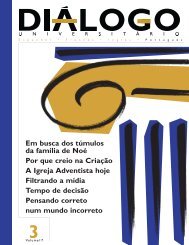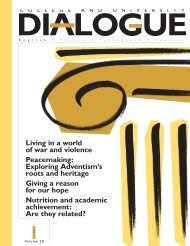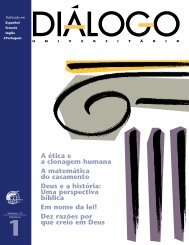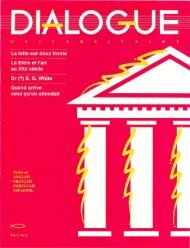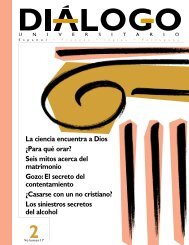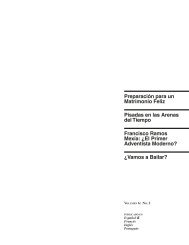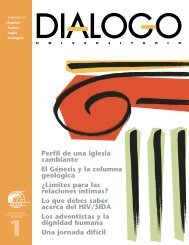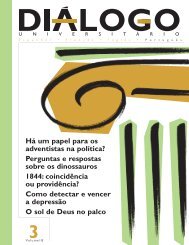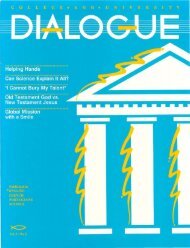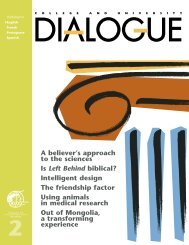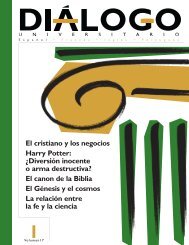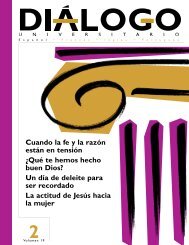Faith, reason, and the educated Christian Creationism - College and ...
Faith, reason, and the educated Christian Creationism - College and ...
Faith, reason, and the educated Christian Creationism - College and ...
Create successful ePaper yourself
Turn your PDF publications into a flip-book with our unique Google optimized e-Paper software.
<strong>Faith</strong>, <strong>reason</strong>, <strong>and</strong><br />
<strong>the</strong> <strong>educated</strong> <strong>Christian</strong><br />
by Humberto M. Rasi<br />
To love God with all your mind<br />
<strong>and</strong> heart is a call to integrate<br />
faith <strong>and</strong> <strong>reason</strong> in one’s<br />
devotion to God <strong>and</strong> pursuit of<br />
life, without giving up <strong>the</strong><br />
priority of God.<br />
Dialogue 15:3 2003<br />
“Lord, help me never to use my <strong>reason</strong><br />
against <strong>the</strong> Truth.”<br />
—A JEWISH PRAYER.<br />
What’s <strong>the</strong> proper relationship<br />
between faith <strong>and</strong> <strong>reason</strong> in<br />
<strong>the</strong> life of a believer? Through<br />
<strong>the</strong> centuries, <strong>the</strong> topic has been of intense<br />
interest <strong>and</strong> concern to thoughtful<br />
<strong>Christian</strong>s. Believers involved in advanced<br />
studies, research, or professions<br />
that challenge <strong>the</strong> basis of one’s faith<br />
continually face <strong>the</strong> dilemma of how to<br />
integrate faith <strong>and</strong> <strong>reason</strong> in <strong>the</strong>ir daily<br />
life. This tension is heightened by <strong>the</strong><br />
fact that many of our contemporaries<br />
assume that intelligent people are not<br />
religious or, if <strong>the</strong>y are, prefer that <strong>the</strong>y<br />
keep such beliefs private.<br />
How has <strong>the</strong> issue been faced by<br />
<strong>Christian</strong> intellectuals in <strong>the</strong> past? This<br />
article will provide a brief historical survey<br />
of <strong>the</strong> options, review key biblical<br />
passages on <strong>the</strong> subject, <strong>and</strong> propose<br />
ways by which thoughtful <strong>Christian</strong>s<br />
can satisfy <strong>the</strong>ir passion to both believe<br />
<strong>and</strong> cultivate a <strong>reason</strong>ed faith.<br />
Premises <strong>and</strong> definitions<br />
According to <strong>the</strong> Scriptures, God created<br />
Adam <strong>and</strong> Eve at <strong>the</strong> beginning of<br />
human history <strong>and</strong> endowed <strong>the</strong>m with<br />
rationality, with “power to think <strong>and</strong> to<br />
do.” 1 Exercising those abilities, our first<br />
parents disobeyed God <strong>and</strong>, as a result,<br />
lost <strong>the</strong>ir perfect status <strong>and</strong> home. Although<br />
we have inherited <strong>the</strong> weaknesses<br />
of <strong>the</strong>ir fallen condition, God has preserved<br />
our capacity to think for ourselves,<br />
exercise trust, <strong>and</strong> make choices.<br />
In fact, one of <strong>the</strong> goals of Adventist education<br />
is “to train <strong>the</strong> youth to be<br />
thinkers, <strong>and</strong> not mere reflectors of o<strong>the</strong>r<br />
men’s thought.” 2<br />
Before proceeding, clarity requires<br />
that we define a few terms:<br />
<strong>Faith</strong>, from a <strong>Christian</strong> perspective,<br />
is an act of <strong>the</strong> will that chooses to place<br />
its trust in God in response to His selfdisclosure<br />
<strong>and</strong> to <strong>the</strong> promptings of <strong>the</strong><br />
Holy Spirit in our conscience. 3 Religious<br />
faith is stronger than belief; it includes<br />
<strong>the</strong> willingness to live <strong>and</strong> even die for<br />
one’s convictions.<br />
Reason is <strong>the</strong> exercise of <strong>the</strong> mental<br />
capacity for rational thought, underst<strong>and</strong>ing,<br />
discernment, <strong>and</strong> acceptance<br />
of a concept or idea. Reason looks for<br />
clarity, consistency, coherence, <strong>and</strong><br />
proper evidence.<br />
Belief is <strong>the</strong> mental act of accepting<br />
as true, factual, or real a statement or a<br />
person. Of course, it is also possible to<br />
hold a belief in something that is not<br />
true.<br />
Will is <strong>the</strong> ability <strong>and</strong> power to elect<br />
a particular belief or course of action in<br />
preference to o<strong>the</strong>rs. Choice is <strong>the</strong> free<br />
exercise of such ability.<br />
Reason <strong>and</strong> faith are asymmetrically<br />
related. It is possible to believe that God<br />
exists (<strong>reason</strong>) without believing in God<br />
or trusting in Him (faith). 4 But it is impossible<br />
to believe <strong>and</strong> trust in God<br />
(faith) without believing that He exists<br />
(<strong>reason</strong>).<br />
I accept <strong>the</strong> primacy of faith in <strong>the</strong><br />
<strong>Christian</strong> intellectual life, as expressed<br />
in two classical formulations: Fides<br />
quaerens intellectum (“<strong>Faith</strong> seeking underst<strong>and</strong>ing”)<br />
<strong>and</strong> Credo ut intelligam (“I<br />
believe in order that I may underst<strong>and</strong>”).<br />
Reason is important to faith,<br />
but it cannot replace faith. To a Chris-<br />
5



